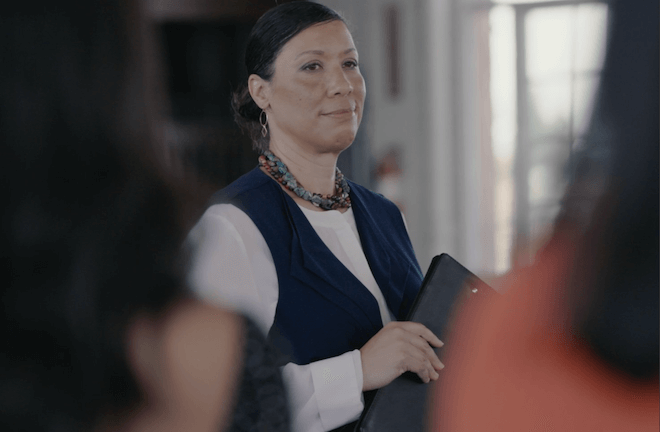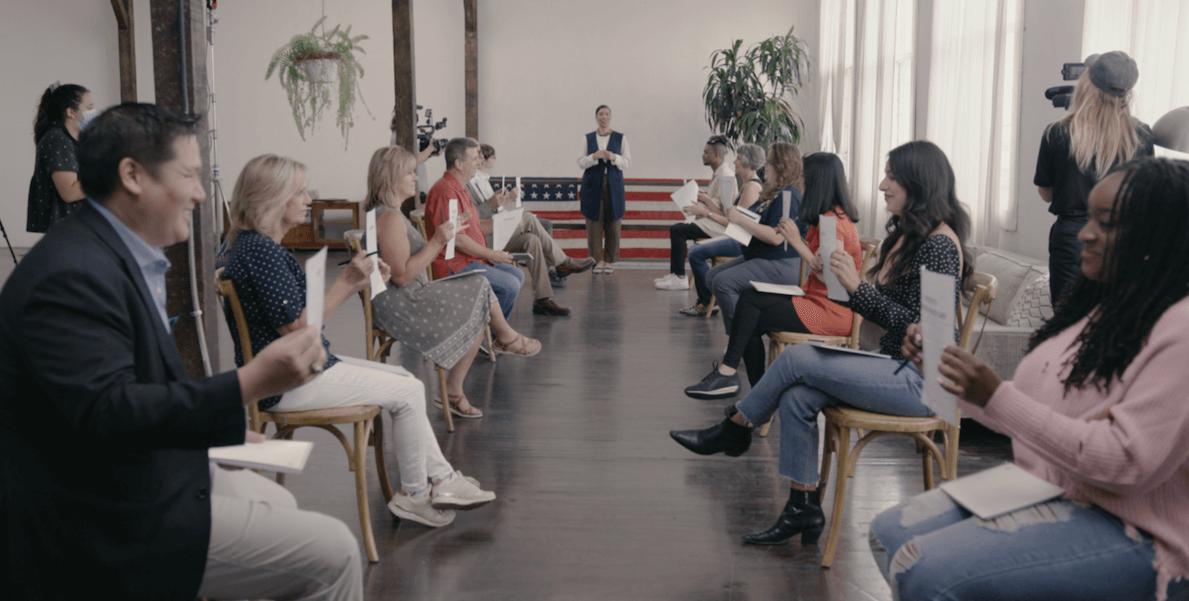Christy Vines would like you to have the hard conversations.
A keynote speaker and social commentator, Vines left a career in national security and global conflict to found the Ideos Institute in 2018. The organization, located in Westlake Village, California, seeks to empathetically engage individuals and organizations in (politically) divisive conversation in the hopes of unifying communities and creating cohesion and resiliency.
“It took us a long time to become one of the most unempathetic or unempathic countries in the world,” Vines says. To have the hard conversations and cohesion will require “a huge social-cultural shift.”

To that end, Ideos is training the next generation of Christian leaders1 in the field of “empathetic intelligence” — the act of engaging others and responding to challenges through empathy. The institute’s approach to training leaders is framed in part by the “true fan” concept, which entrepreneur, teacher and author Seth Godin helped to popularize.2
In Philly, Ideos works in partnership with Penn’s SNF Paideia Program, to provide curricular and co-curricular opportunities for all students to become informed, engaged, and effective community members, and to lead fulfilling and integrated personal, professional, and civic lives. The organization is also in the early planning stage with several PA nonprofits and government offices to bring its Dialogue Lab film series to the Commonwealth of Pennsylvania.
Vines explains, “We recognize trying to go direct-to-consumer or to-audience would have limited impact. Focusing on leaders is a way of scaling the idea. Some of the greatest social and cultural shifts that have happened in history have been because a small group of ‘radicalized,’ very passionate risk-takers, those who had both the most to gain and to lose, decided that an idea was worth spending their life inculcating into the spaces where they were called and where they had a platform.”
In Ideos parlance, as instructed by scripture, empathy is summed up as “counting our neighbors — no matter how strange or different — more significant than ourselves.”
Many of us associate empathy with the act of putting ourselves in the shoes of another. Ideos takes the metaphor a step further: It’s not just walking a mile in said shoes, but making sure the other person has a well-fitting pair of shoes, a pair that might even be more supportive, comfortable, or nicer than your own. Empathy occurs cognitively — recognizing we’re wearing different shoes; relationally — asking about the other person’s shoes and the path they walk; and, according to Ideos, spiritually/morally — being so moved as to act on behalf of someone else, i.e., buying them new shoes. In Ideos parlance, as instructed by scripture, this is summed up as “counting our neighbors — no matter how strange or different — more significant than ourselves.”
Vines comes to the work influenced by her faith and with an understanding of how our affiliations and neurological wiring influence where we position ourselves in and outside of culture and society. She knows that we empathize most easily with those who look and act like we do. Engaging in a conversation with empathetic intelligence means considering what the person opposite us at the table, polling location, school board meeting, picket line, or elsewhere is seeing, hearing, saying, doing, thinking, feeling, and — ultimately — needing.
The best way to get to know Ideos is to watch their hourlong documentary film, Dialogue Lab: America, which brings together 12 Americans from across the ideological spectrum to talk about the 2016 presidential election, abortion, government, guns, policing, race, vaccinations, and other topics you’ve been deftly avoiding at family functions for some years now.

The film debuted this year at Penn, as part of the National Day of Dialogue, an Ideos initiative that brought together a coalition of organizations working to build a movement of empathy and action through virtual events, social media campaigns, and resource-sharing. Vines acknowledged some casting challenges. Filming took place in Los Angeles during the Covid pandemic, and participants were required for insurance purposes to be vaccinated. Both location and pandemic requirements resulted in a smaller pool of conservative thinkers.
As the 12 progress through the workshop, we witness handshakes, hugs, and laughter along with long pauses, deep sighs, raised eyebrows, and conflict. “If we had someone stand up and walk away,” Vines narrates, “that would be a failure.”
Participants disagree, push back, backtrack, apologize, and dig in. Vines moderates (and mediates) the discussion part of the film, encouraging robust conversational volley while acknowledging the limits of it.
“It took us a long time to become one of the most unempathetic or unempathic countries in the world,” Vines says. To have the hard conversations and cohesion will require “a huge social-cultural shift.”
“There was no filter,” Vines told me. “We let people speak as directly and authentically as they felt they needed to.” The goal was never “approval, agreement, or acceptance.” Two people may still passionately disagree by the end of an exchange, but if the approach has been genuine, they will be less adversarial, less defensive, and perhaps a bit softer after having “heard each other’s hearts.”
Spoiler Alert: The film does not solve all our problems, but participants agreed that it was meaningful and that it stirred something within them (some exchanged contact information to continue the conversation).
Despite being daunted at times by the enormity of our polarization, Vines is hopeful. She knows this is the work of generations. What keeps her going is belief in the mission and knowing that making a difference does not require nationwide adoption of the institute’s methodology or even federal legislation, but rather a group of dedicated individuals who are willing to lead with empathetic intelligence wherever they live, work, play, and pray.
We know the conversations are hard, but we recommend that you screen Dialogue Lab: America and recommit to having them. Thanksgiving is just around the corner.
1 The institute serves non-Christians as well. Vines receives inquiries from all sorts of folks desperately seeking a framework in which to promote meaningful conversation.
2 Godin is an entrepreneur and teacher known for his approach toward using marketing tools to effect change. The “true fans” concept involves cultivating a small, dedicated fan base as opposed to one that’s larger but less loyal.
 This article is in RQ’s Summer 2022 issue, “Higher Ground.” Subscribe to Root Quarterly here.
This article is in RQ’s Summer 2022 issue, “Higher Ground.” Subscribe to Root Quarterly here.
Lauren Earline Leonard is the managing editor of RQ. She is a Philadelphia-based writer, director, and producer who founded Earlie Bird Productions in 2017. With EBP she co-wrote and directed V2:Creation Myth (2018), Mother/Daughter (2018), and the original work DREDx (2019). EBP’s The Loneliness Project premiered in May 2022. Leonard is making the most of her B.A. in theater from Temple University as a member of the performance company Humble Materials.
![]() STORIES ABOUT CONVERSATION AND EMPATHY FROM THE CITIZEN
STORIES ABOUT CONVERSATION AND EMPATHY FROM THE CITIZEN



